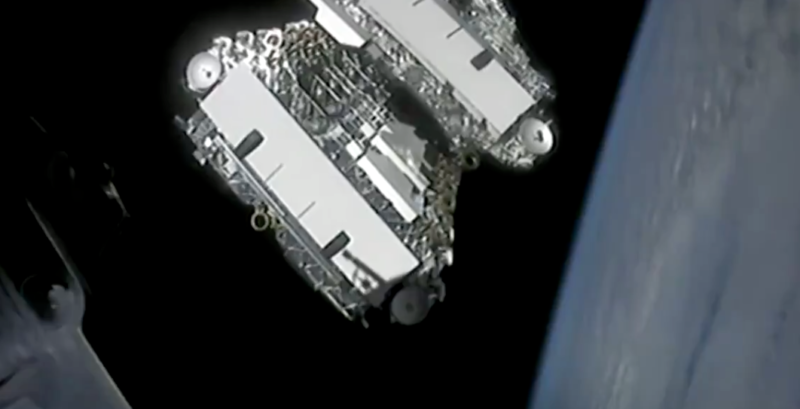Viasat Requests FCC Look Into Environmental Impact of SpaceX’s Starlink Constellation

60 Starlink satellites deployed on April 22. Photo: SpaceX
Viasat has taken issue with SpaceX’s request to lower the orbital altitude of its Starlink satellite constellation, and requested the FCC to prepare an environmental impact statement on Starlink.
In an FCC filing on Dec. 22, Viasat outlined its environmental concerns with Starlink and with SpaceX’s request to relocate the satellites to lower orbital altitudes, specifically arguing that the modification would accelerate the time period in which the satellites reenter the atmosphere; it would likely increase light pollution; and would likely increase space debris.
Viasat has asked the FCC to prepare an environmental impact statement or an environmental assessment under the National Environmental Policy Act (NEPA), which requires federal agencies to detail the environmental impacts of major federal actions.
Viasat argued that SpaceX prioritizes “disposability and replaceability” of its satellites over “reliability and safety.” According to the filing, SpaceX has said that lowering the altitude of its satellites would make the time period in which its satellites would burn up in the atmosphere less than five years, which SpaceX has said in the past will lead to a cleaner orbital environment.
But Viasat argues that SpaceX’s plan to launch an estimated 10,000 satellites over 15 years to maintain a fleet of 4,408 operating satellites is “unprecedented” and “there is no base of experience on which the Commission can draw to determine that granting the proposed modification.”
Viasat, citing research from The Aerospace Corporation, argued that when satellites built from aluminum, like Starlink, burn up, they can produce aluminum oxide or alumina, which contributes to climate change. Viasat also claimed that SpaceX’s Starlink plans “could increase the risk of health-related harm to the human environment to an unacceptable level.”
“It is our obligation as users of orbital space — and the commission’s responsibility as a regulator of its commercial use — to ensure that technologies are deployed responsibly and efficiently, informed by an understanding of potential impacts to the Earth, its orbital environment, and its inhabitants,” Viasat argued in the filing.
SpaceX has not responded in a formal filing to the FCC, but on Dec. 29, Elon Musk tweeted: “Starlink poses a hazard to Viasat’s profits, more like it. Stop the sneaky moves, Charlie Ergen!” referencing the co-founder and chairman of Dish Network and Echostar, which owns Hughes Network Systems, Viasat’s satellite broadband competitor in the U.S. Ergen is not involved with Viasat.
Later, Musk tweeted: “And Mark Dankberg. This action is wack, not dank!!” referencing Viasat co-founder and executive chairman.